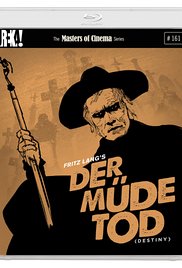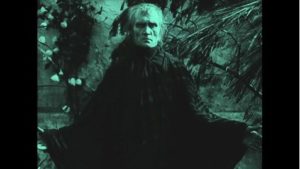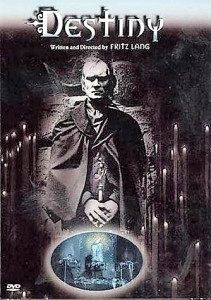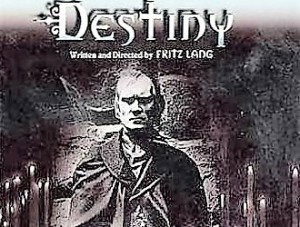Destiny [Der Müde Tod] **** (1921, Lil Dagover, Rudolph Klein-Rogge, Walter Janssen, Bernhard Goetzke) – Classic Movie Review 3545

Lil Dagover, Rudolph Klein-Rogge and Walter Janssen star in this stylish early Fritz Lang 1921 sci-fi silent movie. In the story and screenplay by Thea von Harbou and Lang, a young couple stop over at a village inn, where Death [Der Tod] (Bernhard Götzke [Goetzke]) abducts the young man (Janssen) and sticks him behind a huge wall.
The young woman (Dagover) finds a mystic entrance and meets Death, who tells her three exotically set stories connected to her predicament, in which a woman tries and fails to save her lover from his tragic fate. The young woman now knows her only way to save her fiancé from Death is by finding someone to die in his place. Death shows the woman three candles and promises to reunite her with her fiancé if can can keep just one of the candles from extinguishing.
Lang uses the heroine’s subsequent travels to three time/place zones (Persia in Arabia, quattrocento Venice, and ancient China) to showcase his startling visual flair with fantasy – further developed in his Metropolis (1927) – and his sharp story-telling skills. Even though it is directed by Lang, it is a largely forgotten silent era masterwork, a lost movie in many ways as no negative or contemporay prints with the original colours have survived. The cinematographers are Fritz Arno Wagner, Bruno Mondi and Bruno Timm.
Also in the cast are Georg John, Erich Pabst, Hermann Picha, Lewis Brody and Paul Biensfeldt.
Thea von Harbou was married to Rudolf Klein-Rogge (1914 – 1921) (divorced) and Fritz Lang (26 August 1922 – 26 April 1933) (divorced). But in 1932, von Harbou joined the NSDAP, or Nazi Party, and Lang, who was opposed to the Nazis, left her and emigrated to America. She was briefly interned after the end of World War Two but later returned to the film industry synchronising foreign films.
In 1954 Destiny [Der müde Tod] was shown again in Berlin and Thea von Harbou was guest of honour. When she left the cinema she slipped and fell, and died some days later, aged 65. Destiny, indeed.
The intertitles were long believed lost but Munich Stadtmuseum director Enno Patalas recovered most of them from the Cinématèque Française with the help of German film critic Lotte Eisner. Kino released a restored version on Blu-ray in 2016, which includes simulations of Lang’s original colour tintings, thanks to the Murnau Foundation.
The new 2K restoration by Anke Wilkening, accompanied by a new score by Cornelius Schwehr, is released in UK cinemas by Eureka! on 9 June 2017 and on DVD/Blu-ray on 17 July.
© Derek Winnert 2016 Classic Movie Review 3545
Link to Derek Winnert’s home page for more reviews: http://derekwinnert.com/





